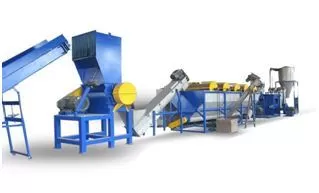Plastic waste is a growing concern globally. In Africa, this issue is particularly pressing. Mountains of plastic waste are piling up, threatening the environment and public health. But there’s a silver lining: the plastic recycling industry is emerging as a beacon of hope. So, how is this industry developing in African countries?

The plastic recycling industry in Africa is on the rise, driven by innovative entrepreneurs, supportive policies, and growing environmental awareness. This sector is transforming waste into valuable resources, creating jobs, and protecting the environment.
Curious to learn more? Let’s delve into the fascinating world of plastic recycling in Africa and see how this industry is shaping the continent’s future.
What Drives the Growth of the Plastic Recycling Industry in Africa?
Entrepreneurial Spirit
Africa is home to some incredibly innovative entrepreneurs. These pioneers are turning plastic waste into business opportunities. By creating products from recycled plastics, they are addressing the waste problem while generating income. This entrepreneurial spirit is a key driver of the recycling industry’s growth.
Supportive Policies
Governments across Africa are implementing policies to encourage recycling. Bans on single-use plastics, tax incentives for recycling businesses, and public awareness campaigns are helping to create a favorable environment for the recycling industry.
How Does Plastic Recycling Benefit African Economies?
Job Creation
One of the most significant benefits of the recycling industry is job creation. Recycling facilities require workers for collection, sorting, and processing. This industry provides employment opportunities, particularly in urban areas where job scarcity is a major issue.
Economic Diversification
Plastic recycling also contributes to economic diversification. By developing new industries and reducing reliance on imports, African countries can create more resilient economies. The recycled products market is growing, offering new revenue streams for local businesses.
What Challenges Does the Plastic Recycling Industry Face in Africa?
Infrastructure Issues
While the recycling industry is growing, it faces significant challenges. One major issue is the lack of infrastructure. Many regions lack proper waste management systems, making it difficult to collect and process plastic waste efficiently.
Public Awareness
Another challenge is the lack of public awareness. Many people are still unaware of the benefits of recycling or how to properly dispose of plastic waste. Public education campaigns are essential to change this mindset and promote recycling practices.
How Are Innovations Boosting Plastic Recycling in Africa?
Technological Advancements
Technological advancements are playing a crucial role in boosting the recycling industry. Innovations such as mobile recycling units and advanced sorting technologies are making recycling more efficient and accessible. These technologies help to process plastic waste more effectively, increasing the output of recycled materials.
Sustainable Products
Recycling businesses in Africa are creating sustainable products from recycled plastics. These products range from construction materials to fashion items, demonstrating the versatility of recycled plastics. By producing high-quality goods, these businesses are driving demand for recycled materials.
Who Are the Key Players in Africa’s Plastic Recycling Industry?
Small and Medium Enterprises (SMEs)
Small and medium enterprises (SMEs) are at the heart of Africa’s recycling industry. These businesses are often community-driven and focus on local waste issues. SMEs are vital for the industry’s growth, as they are agile and can adapt quickly to changing market conditions.
Non-Governmental Organizations (NGOs)
Non-governmental organizations (NGOs) also play a crucial role. They support recycling initiatives through funding, training, and advocacy. NGOs help to bridge the gap between communities and the recycling industry, promoting sustainable practices and environmental awareness.
What Are the Environmental Impacts of Plastic Recycling in Africa?
Reduction in Plastic Waste
Recycling significantly reduces the amount of plastic waste in the environment. By converting waste into valuable products, the industry helps to clean up streets, rivers, and oceans. This reduction in waste is crucial for protecting Africa’s diverse ecosystems.
Conservation of Resources
Plastic recycling also conserves natural resources. By reusing materials, the need for virgin plastic production decreases, saving energy and reducing carbon emissions. This conservation is vital for sustainable development and environmental protection.
Conclusion
The plastic recycling industry in Africa is a dynamic and rapidly growing sector. It addresses critical environmental issues, creates economic opportunities, and fosters innovation. However, challenges such as infrastructure and public awareness need to be addressed to fully realize the industry’s potential. By supporting recycling initiatives and embracing sustainable practices, we can turn the tide on plastic pollution and build a greener future for Africa.
That’s it!
